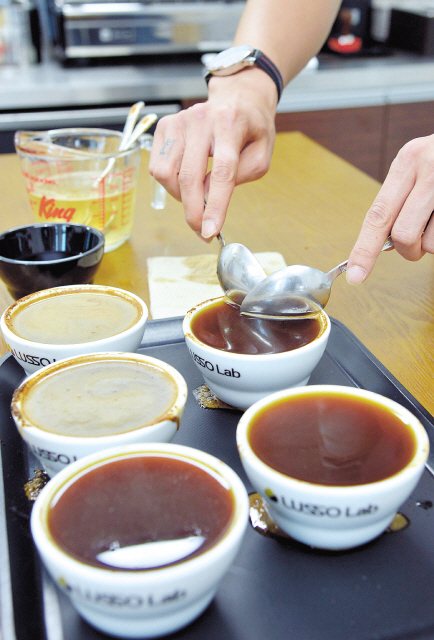In a dark alley near Hongdae there is a small coffee shop. There is no sign ― no way of knowing it is the right place, save for the scent of roasted coffee, a cross between chocolate and tobacco, confirming it is Cafe Libre.
Three times a week, Cafe Libre holds free public coffee tastings, called cuppings in coffee speak. These are intimate, casual gatherings that suit the shop’s low-profile attitude. Chairs are pushed into the corners. A tall, long table is brought out. Stout cups of coffee grounds are lined up on the table.
Hot water is poured to the brim. Steam rises. Four minutes pass. People pick up spoons and start to push away the grounds, bending over to smell the coffee.
Opinions are exchanged as everyone waits for the grounds to steep. Then the slurping begins. Slurp, hold, spit, slurp, hold, spit.
Sharper impressions start to form. Grapefruit, wheat, steak, these are some of the descriptions of flavors that are shared between strangers, between friends.
Though Cafe Libre is in its infancy, a mere four-to-five-months-old, its public tastings have attracted a loyal following.
“I come here three times a week,” said coffee aficionado Kim Koun-wok, 35.
Kim, who is in the game sales business, revealed that “there are lot of people around me who enjoy coffee cupping as a hobby.”
Right now, cupping is hot, not just as a fun pastime, but as a profession. More and more Koreans are becoming Coffee Quality Institute-certified expert coffee cuppers (referred to as Q-graders by the industry).
 |
During the coffee cupping process, one must first skim the grounds off the surface with two spoons and discard before tasting as demonstrated above at the Lusso Lab Academy in Seoul. (Kim Myung-sub/The Korea Herald) |
According to the Coffee Quality Institute’s official website (www.coffeeinstitute.org), there are currently around 762 licensed Q-graders in Korea out of a total, worldwide figure of over 1,000.
“Korea has the highest number of certified Q-graders in the world,” said Coffee Libre head Seu Pil-hoon, 35, one of the nation’s first licensed Q-graders.
“Back in the day, coffee was something you tipped back to give you a jolt when you were tired or something you drank while chatting with friends,” said Seu, who also opened Cafe Libre. “Now that’s changing. People are treating coffee like wine with a vintage, a region and a chateau.”
What Seu means is that a growing number of people are more selective about where their coffee comes from and how it is blended and roasted. In other words, people are more interested in specialty coffee.
“Specialty coffee is becoming trendy, so you need to be able to tell the difference from one lot of coffee beans to the next,” said the seasoned buyer-and-roaster, explaining why cupping is catching on.
Specialty coffee is basically gourmet coffee. If one goes by the Specialty Coffee Association of America’s definition, specialty coffee is coffee that has scored at least 80 points on a scale of 100.
Who scores specialty coffee? Q-graders do.
Q-graders are the experts who can tell the difference between super good coffee and good coffee. Q-graders can tell if a batch of green, unroasted coffee beans has the potential to become a great cup of coffee or a mediocre cup of coffee. This is why many roasters and buyers know how to cup, because it helps them do their job.
“Coffee roasters and green bean buyers must know how to cup,” head instructor Lee U-hee of the Seoul-based coffee school Lusso Lab Academy said.
“Cupping is a must for purchasing beans through online micro-lot auctions,” Lee, 39, explained. “One needs to be able to understand coffee cupping jargon and the scoring system.”
Now that South Koreans care even more about how their coffee tastes and about the pedigree of their coffee, more people in the Korean coffee industry are getting certified to meet that demand, to buy and roast premium coffee for increasingly discerning consumer palates.
Yet, according to head instructor Lee, that is not the only reason why Korea has so many licensed Q-graders.
“Of course this is happening because there is industry demand for Q-graders,” said Lee, but it is also happening because cupping is trendy and “Koreans are trend sensitive.” Furthermore, “one can get certified here now, whereas before one had to go abroad to get licensed.”
These days, one can get accredited on home turf at places like Lusso Lab Academy. That was not the case four years ago, when Coffee Libre’s Seu made the long trip to America to get his Q-grader license.
Seu, an international jury member for the 2012 Mexico Cup of Excellence competition, remembers a time when cupping as a profession was non-existent in South Korea.
The year was 2006. Seu was studying at Korea University, working at a cafe near campus and learning about coffee in his spare time.
“I couldn’t find good sources in Korean so I had to look up American sources, and then I read that cupping was important but no one in Korea knew anything about it,” Seu recalled.
Seu trekked out to America to learn more. In 2008, he took and passed the Q-grader test. Now, four years later, there over 700 licensed Q-graders in South Korea.
In a short span of time, then, coffee cupping as a field has boomed. What does that mean for the average coffee drinker? Hopefully, it translates to more great coffee roasted and brewed to perfection.
Cafe Libre227-15 Yeonnam, Mapo, Seoul/(02) 334-0615/ www.coffeelibre.kr/ open 4 p.m. to 9 p.m. Tuesdays through Sundays/ free public cupping classes held every Tuesday, Thursday, Saturday at 8 p.m.
Lusso Lab Academy
6F, The First Building, 51-6 Nonhyeon-dong, Gangnam-gu, Seoul/ (02) 512-9952/www.lussolab.co.kr
By Jean Oh (
oh_jean@heraldcorp.com)



![[Herald Interview] Kim Woo-bin grew to appreciate ‘unseen’ heroes with ‘Officer Black Belt’](http://res.heraldm.com/phpwas/restmb_idxmake.php?idx=644&simg=/content/image/2024/09/20/20240920050440_0.jpg)




![[Exclusive] [Herald Interview] MBK incapable of running Korea Zinc’s Australia business: Aussie renewable energy CEO](http://res.heraldm.com/phpwas/restmb_idxmake.php?idx=644&simg=/content/image/2024/09/20/20240920050535_0.jpg)